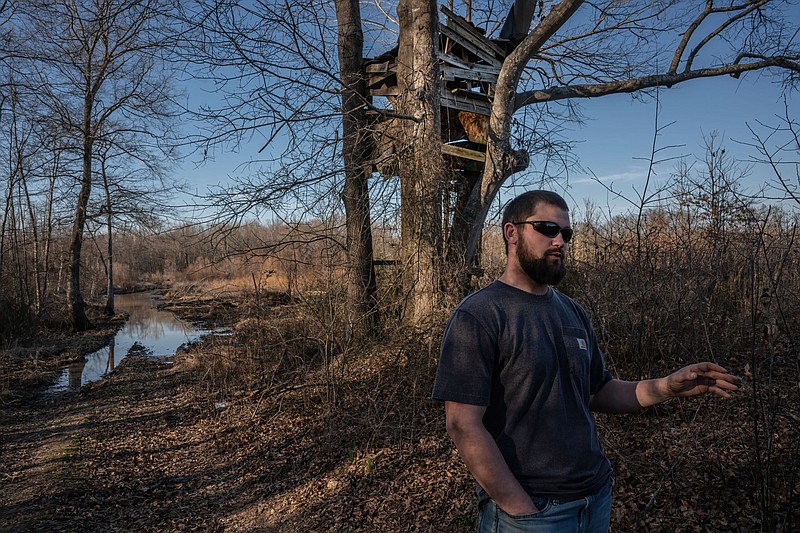CAMDEN, Tenn. – Hunter Hollingsworth, at first, didn't grasp it was a surveillance camera giving off the glint in the sun from a high tree branch about a mile past the no-trespassing sign that marks his family's remote property in west Tennessee.
But something about the shine made him stop his truck. By the time he'd climbed up to investigate, grabbed the electronic device lodged in the tree, driven home and examined a SIM card, Hollingsworth understood there was a surveillance device trained to capture his movements for months in a 24-7 live feed viewable to officials with the Tennessee Wildlife Resources Agency.
Hollingsworth's 2018 discovery, and the string of events that followed, have led to a long legal battle with state wildlife officials over his right to privacy free of government intrusion and video surveillance on his property.
It's a fight, Hollingsworth said, that has proved consuming over the past four years - straining his relationship with his girlfriend at times while keeping on a slow burn the spark of rage he first felt seeing images of himself and his friends in the secret government surveillance footage on the SIM card. Hollingsworth's lengthy legal battle may soon be reaching a head.
A three-judge panel, convened in Benton County last December, is weighing Hollingsworth's challenge to the constitutionality of the Tennessee Wildlife Resources Agency's practice of conducting warrantless patrols, searches and surveillance on private property.
It is a practice rooted in a Tennessee law that gives the agency the right to search and surveil private property in order to enforce hunting, fishing and wildlife laws – an authority not explicitly extended to any other state or local law enforcement, including county sheriffs or local police.
Agency officers may "go upon any property, outside of buildings, posted or otherwise," the law says.
Hollingsworth - along with his neighbor, Terry Rainwaters, who claims the agency engaged in warrantless searches on his property, too – have asked the panel of state judges, convened under a new law requiring panels for state constitution claims, to find the law unconstitutional.
(READ MORE: Tennessee bill would strip agency of ability to keep revenue from timber sales)
Represented by attorneys with the Institute for Justice, a libertarian-leaning nonprofit law firm, the pair have argued the agency's warrantless forays onto private property violate Article 1, Section 7 of the Tennessee Constitution, which says in part: "The people shall be secure in their persons, houses, papers and possessions, from unreasonable searches and seizures."
Said Hollingsworth in an interview earlier this month, "If they can just come at will, whenever they want and wherever they want, what's the value of private property?"
"If they're going on private land, they should have to get a warrant. They abuse their authority, and nobody has a check on it. If hunting over bait [illegally luring game through bait] is so much worse than trafficking kids or other serious crimes that need a warrant, then they need a warrant."
U.S. Supreme Court and the Tennessee Constitution
Agency officials said last week they do not comment on pending litigation, but in legal documents and in affidavits filed in the case, state wildlife officers said they must have the flexibility to enter private property to enforce the state's hunting, fishing and wildlife laws. The agency's mission is to protect wildlife and to enforce hunting, fishing and boating rules.
Because 90% of the land in Tennessee is privately owned and where the majority of hunting takes place, agency officers cannot do their jobs without patrolling private property, attorneys for the agency have argued.
The agency has also cited a well-established U.S. Supreme Court precedent, known as the "open fields" doctrine. The doctrine says property owners have no "reasonable expectation of privacy" on private lands deemed to be an open field - property outside the immediate vicinity of an owner's home and yard, like a field of crops outside the farmer's homestead.
The U.S. Supreme Court has found warrantless searches in open fields do not violate the Fourth Amendment's guarantee against unreasonable searches and seizures.
Joshua Windham, an attorney with the Institute for Justice representing Hollingsworth and Rainwaters, said the Tennessee Constitution provides its own protections, and the law giving the Tennessee Wildlife Resources Agency the right to warrantless entry on private property clearly conflicts with the state constitution.
"It's an agency of law enforcement that believes it has complete discretion," said Windham, noting no other law enforcement agency in the state has the same powers for entering private property without a warrant as the Tennessee Wildlife Resources Agency has spelled out in state law.
(READ MORE: Lawmakers weigh in to oppose Tennessee Wildlife Resources Agency clearcutting)
An armed raid, then charges of theft
Hollingsworth has been hunting on the 90-acre property, a mix of marshy habitat, fields and tree cover, that has been owned by his family since he was a teen.
The site is accessible only through a gate marked "private property" that leads to a primitive dirt driveway, first winding through his neighbors' property before reaching the vacant land his dad bought 25 years ago.
The land is set aside purely for hunting and recreation, Hollingsworth said. He and his friends have hunted rabbits, turkeys, deer, ducks and raccoon there since he was a teenager, he said. He and his girlfriend have also occasionally camped on the property.
The camera, Hollingsworth said, was an acute invasion of privacy, capable of capturing images of him being intimate with his girlfriend, relieving himself in the outdoors and partying with his friends.
But what happened after he discovered the secret surveillance troubles Hollingsworth more.
Weeks after he discovered the secret camera, he heard a knock at the door to his home, located on a separate property.
It was early in the day, and Hollingworth and his girlfriend weren't fully dressed. Outside were at least half a dozen men dressed in khaki pants and bullet-proof vests, including at least one armed with an assault rifle, Hollingsworth said. Frightened, Hollingsworth's girlfriend ran for the bedroom.
They were both detained and arrested.
Hollingsworth was charged with six counts related to illegally hunting waterfowl, including illegally baiting game birds.
He and his girlfriend were also charged with a seventh count: stealing the surveillance camera secretly installed on his property.
The camera, according to court filings, was installed after agents with the U.S. Fish & Wildlife Service were contacted by agency officers alleging Hollingsworth was violating federal game bird regulations. Federal authorities did get a warrant for the camera. In court filings, agency officials noted that the warrant was unnecessary.
In the course of the lawsuit Hollingsworth and his neighbor later filed, scores of video and photographic evidence emerged showing instances when agency officers, armed with their own cameras and audio recording equipment - and sometimes crouched behind bushes - captured Hollingsworth and friends shooting game.
While sportsmen are required to wear bright clothing as a signal of their presence to other hunters, Tennessee Wildlife Resources Agency officials do not, creating a potentially dangerous situation during surreptitious surveillance, Windham said. Video taken by agency officers shows them in the line of fire for hunters.
Some videos captured agency officers trudging through the isolated Hollingsworth property and narrating their surveillance of corn kernels near duck blinds or wet fields with corn cob remnants.
Audio evidence filed in the case captured at least one occasion when Hollingsworth was on his property when confronted by agency officials.
(READ MORE: Study recommends curtains of unpleasant bubbles to fence Asian carp in Tennessee waters)
"Hunter, stop for a second, all right?" the agent said to Hollingsworth. "We got some stuff to talk about. Set your bucket down We've got some stuff to talk about it. Ain't no sense in getting upset."
Responded Hollingsworth, "Ain't no sense you coming down here every time I hunt. Ain't nobody invite you."
Said the agent, "When you bought your hunting license you invited me."
Hollingsworth later pled guilty to one charge of baiting wildlife - an allegation he still denies. He lost his hunting license for three years. The charges against his friends and girlfriend were dropped.
"I'm not saying I never did anything wrong," he said. "But they threatened to charge my girlfriend because she lives with me. She would have lost her job because she needs to travel for work. She doesn't have anything to do with hunting."
Read more at TennesseeLookout.com.

